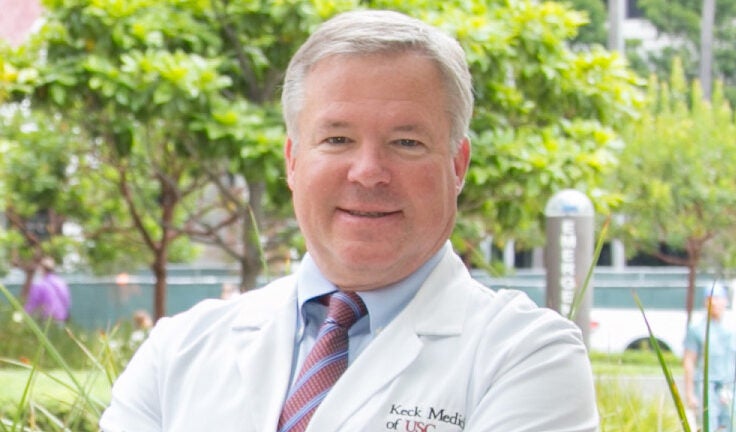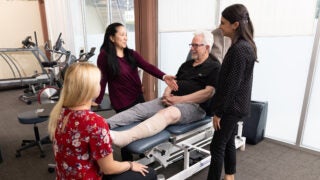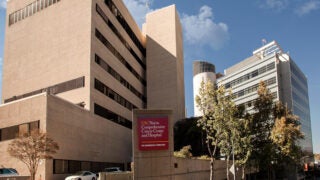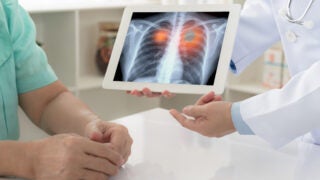
Mark Cunningham feels right at home with robotic surgical devices, less invasive procedures and new high-tech medical tools. (Photo/Richard Carrasco III)
To Heal His Patients, This Heart Surgeon Turns to Tech
An engineer-turned-surgeon advances next-generation tools.
In college, Mark Cunningham studied turbines, engines and propulsion systems to prepare for a career as an aeronautical engineer. Naturally tech-minded, he seemed destined to design complicated aircraft and gizmos. Today, decades later, he devotes his time to fixing a machine that may be unrivaled in its complexity.
Is it the International Space Station? Or NASA’s Mars rover, perhaps? No, this machine might be even more challenging than spacecraft.
Cunningham repairs the human body.
All these techniques we develop are so we can treat people sooner.
Mark Cunningham
The Keck Medicine of USC cardiothoracic surgeon treats heart disease and dysfunction with a distinctly innovative spin. As surgical director of Keck Medicine’s heart transplant program, he constantly looks for ways to improve surgery and teach improved procedures to up-and-coming doctors.
But don’t get him wrong: He brings the latest technology into the field for the sake of his USC heart surgery patients — not for the novelty of tech.
“All these techniques we develop are so we can treat people sooner,” says Cunningham, associate professor of clinical surgery at the Keck School of Medicine of USC. “That way, they don’t have to get to death’s doorstep before we help them.”
USC heart surgery guided by a passion for technology that helps people
People are the reason Cunningham made a shift in his career path many years ago.
As a young aspiring pilot, the Connecticut native enrolled at Embry-Riddle Aeronautical University, where he discovered a passion for aircraft design. He even interned at NASA Langley Research Center, where he worked after college with a group that designed rockets and space shuttles. Yet he also was interested in medicine — so much so that he took anatomy and biology classes in his spare time. Eventually, he made the switch to medical school at the University of Miami for a simple reason: He liked working with people more than being in a computer lab.
Mark Cunningham uses the latest robotic surgical tools and devises new procedures, all with the goal of helping his patients heal better and faster.
Now the USC heart surgeon combines both worlds — humanity and technology — to benefit his patients. It’s a perfect fit. “When you think about it, heart surgery is really technical and detail-oriented,” he says. “It’s basically fluid dynamics, which I had studied in aerospace engineering.”
He embraces modern tools like the da Vinci Surgical System, a robot that assists doctors as they perform delicate operations like heart bypasses. He helped pioneer new procedures that are easier on patients than traditional surgeries, like replacing faulty heart valves with new ones delivered through a narrow tube threaded through an artery in the leg. He also works with medical device companies as they design and test their newest tech.
“The latest thing we’re working on are these new mitral valves that you put in through a tiny incision in the chest,” he says enthusiastically. “As the field moves along, we try to push that new technology forward. I really like learning new things.”
Sometimes device companies have prototypes and want his expert opinion. Who better to give feedback on their design than a surgeon-engineer?
“I’ll say, ‘I like this feature, I don’t like that feature, this handle is too small, this is too awkward,’” Cunningham says. “When they finally have the device all tuned up, then they’ll come ask us to find a group of patients to try it out.
“With an engineering degree, I can work with them at a lot of different touchpoints in the process of bringing a technology along.”



